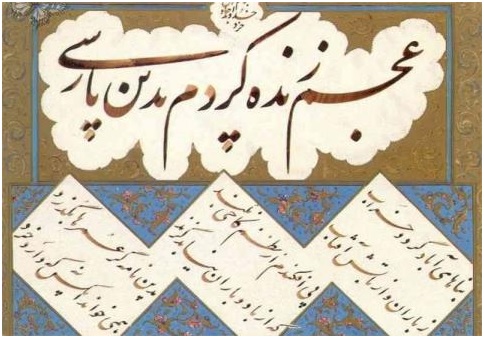
This issue discusses necessity of teaching Farsi language and it begins with an article by Hassan Zolfaghari which argues reasons for preserving, promoting and teaching Farsi language by educational system. Answering the question “why Farsi language must be preserved”, Zolfaghari mentions a series of reasons. In a part of this article he writes: Weakening this language leads to weakening political system and national collapse. On the other hand, strengthening it, fortifies our national identity, so supporting this language is appreciating this valuable heritage and reinforcing our national roots. Farsi language is unifying factor which bonds all Iranian clans, races and tribes.
This professor refers then, to international face of Farsi language and its history and says: Farsi language domains a territory from North of China to Indian subcontinent to the parts of Europe. Farsi has spread its rich culture from China to Yugoslavia at and from Caucasus mountains at north to the vast India at south. In the not so far a past, official Farsi had been official language of Indian subcontinent and a large part of Ottoman Empire.
Farsi language has a multi millennium ancient history. It is coming from Intermediate Persian (Pahlavi) which in turn comes from Ancient Persian. Farsi is now official language of Iran, Afghanistan (Dari), Tajikistan (Tajikistani Farsi), and parts of Uzbekistan. 110 million people talk this language (Iran 70 mil, Afghanistan 20 mil, Tajikistan 5 mil, Uzbekistan 7 mil and 8mil scattered).
On 1872 in a European Linguistics meeting in Berlin, Farsi was recognized as a classic language along other old languages and now Farsi is 12th most using language in cyberspace.
Next article is a report about status of Farsi Language in the country’s schools. The article reflects a report presented at 456th session of Persian Academy about Farsi language in the schools. The report reveals that it is not such a good condition for Farsi language among students. It also surveys effects of students’ future career in learning Farsi language.
An interview with Ehsan Ghabool, head of center of Farsi language for foreigners of Ferdowsi University of Mashhad is another article in this issue. In a part of this interview, he talks about the problems in Farsi textbooks for universities and says: In academic education factors like educational system and way of teaching are more important than educational contents, nevertheless academic contents, regardless of their variety, must comply with standards like accordance with community requirements, teaching skills and teaching criticism.
According to our field studies, students of Farsi language have absorbed no sense of criticism after four years of study and this is a disaster. It means that we feed students with a bunch of compressed and unsystematic data and in the end; there is no growth in his sense of criticism.

Add new comment